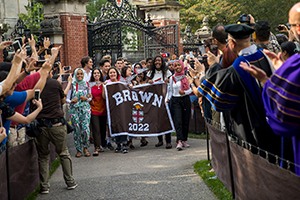Two years ago when Isabel Riches’ younger sister was diagnosed with Type 1 diabetes, Riches knew she needed to do something. Both sisters were heavily involved in high-level competitive water polo, yet her sister couldn’t safely wear her continuous blood glucose monitor during practice or games. This safety concern concentrated Riches’ pre-existing interest in medicine.
“Diseases like diabetes, especially when they affect people who are so young, become part of their identity,” Riches said. “I felt like I just had to build a bridge between the sport my sister loved and her illness.”
After researching methods to attach blood glucose monitors and available accessories, Riches built her first cushiony protective “collar” prototype out of a yoga mat. From there she researched other waterproof foam materials and explored different designs.
Riches, with her sister’s help, tested the fit and durability of several prototypes during water polo practice before settling on a design. She also made prototypes for other athletes in her sister’s diabetes support group.
“When my sister was named all-tournament most valuable player at the 2017 water polo Junior Olympics national championships, I was so happy that she was living her best life and succeeding even with her implanted glucose monitor,” she said.
Riches filed for and received a provisional patent for her support collar. She is currently exploring options for a non-provisional patent while considering potential liability issues.
In addition to playing on her high school’s varsity water polo team and for several U.S. Junior Olympics teams, this spring Riches joined Great Britain’s junior national water polo team — she has dual citizenship thanks to her father — and won her first international championship in May.
At Brown, Riches will play on the varsity water polo team, investigate her pre-med options and dive into her interest in musical theatre.
“I want to make a difference in the world,” she said. “With Brown’s community supporting my intellectual independence, I can explore who I might be as a doctor and as a person.”
